
Music Director
After wowing audiences with his astounding production of Lulu in 2015, South African artist William Kentridge now focuses his extraordinary visual imagination on Berg’s other operatic masterpiece, set in an apocalyptic pre–World War I environment.
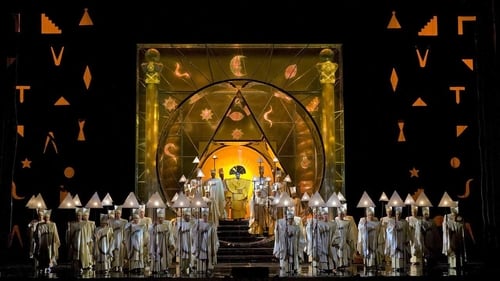
Conductor
Met Music Director Emeritus James Levine conducts Tony Award winner Julie Taymor’s production of Mozart’s masterpiece, Die Zauberflöte. Golda Schultz makes her Met debut as Pamina with Kathryn Lewek as the Queen of the Night. The holiday presentation of The Magic Flute, an abridged staging sung in English for families, was the first Live in HD performance to be transmitted. This is the first time the full-length German opera will be seen in the series.

Conductor
Julie Taymor’s kaleidoscopic production returns to select cinemas this holiday season in an encore presentation of the company’s first-ever Live in HD transmission that includes tenor Matthew Polenzani, baritone Nathan Gunn, and bass René Pape in this abridged, English-language version of Mozart’s classic fable.

Conductor
Mozart’s early masterpiece returned to the Met for the first time in more than a decade with Music Director Emeritus James Levine, who led the work’s company premiere in 1982, again on the podium. Tenor Matthew Polenzani brings both steely resolve and compassionate warmth to the title king of Crete, who is faced with an impossible decision. With her rich mezzo-soprano, Alice Coote sings the trouser role of Idomeneo’s son Idamante, who loves the Trojan princess Ilia, sung with delicate lyricism by Nadine Sierra. Elza van den Heever gives a thrillingly unhinged portrayal of the jealous Elettra. Jean Pierre-Ponnelle’s timeless production blends the grandeur of ancient myth with the elegance of Enlightenment ideals.

Self - Conductor
Mozart’s early masterpiece returned to the Met for the first time in more than a decade with Music Director Emeritus James Levine, who led the work’s company premiere in 1982, again on the podium. Tenor Matthew Polenzani brings both steely resolve and compassionate warmth to the title king of Crete, who is faced with an impossible decision. With her rich mezzo-soprano, Alice Coote sings the trouser role of Idomeneo’s son Idamante, who loves the Trojan princess Ilia, sung with delicate lyricism by Nadine Sierra. Elza van den Heever gives a thrillingly unhinged portrayal of the jealous Elettra. Jean Pierre-Ponnelle’s timeless production blends the grandeur of ancient myth with the elegance of Enlightenment ideals.
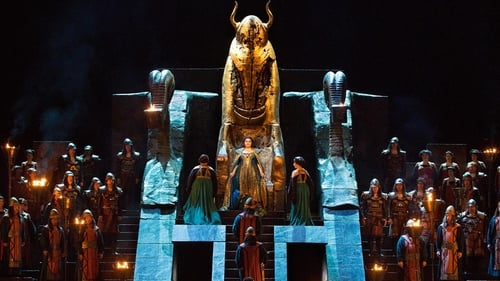
Conductor
The legendary Plácido Domingo brings another new baritone role to the Met under the baton of his longtime collaborator James Levine. Liudmyla Monastyrska is Abigaille, the warrior woman determined to rule empires, and Jamie Barton is the heroic Fenena. Dmitri Belosselskiy is the stentorian voice of the oppressed Hebrew people.

Self - Conductor
The legendary Plácido Domingo brings another new baritone role to the Met under the baton of his longtime collaborator James Levine. Liudmyla Monastyrska is Abigaille, the warrior woman determined to rule empires, and Jamie Barton is the heroic Fenena. Dmitri Belosselskiy is the stentorian voice of the oppressed Hebrew people.

Conductor
Met Music Director James Levine leads this Live in HD presentation of Wagner’s early Romantic opera, starring Johan Botha in the title role of the minnesinger torn between earthly passion and true love. Eva-Maria Westbroek is Elisabeth, whose unswerving devotion redeems Tannhäuser’s soul, and Peter Mattei sings Wolfram, his faithful friend. Michelle DeYoung as the love goddess Venus and Günther Groissböck as Landgraf Hermann complete the cast. Otto Schenk’s classic production was the first of his acclaimed Wagner stagings at the Met.

James Levine leads a stirring performance of Wagner’s epic comedy, seen in Otto Schenk’s classic production. Baritone Michael Volle stars as Hans Sachs, the cobbler-poet at the heart of this story of love, art, and youth vs. age. Leading Wagnerian tenor Johan Botha is Walther von Stolzing, the young knight whose new ideas upset the traditional ways of the mastersingers, and Annette Dasch sings Eva, the girl he loves, whose hand has been promised to the winner of a singing contest. Johannes Martin Kränzle as the pedantic town clerk Beckmesser, Hans-Peter König as Pogner, Eva’s father, and Paul Appleby as David, Sachs’s apprentice complete the stellar cast.
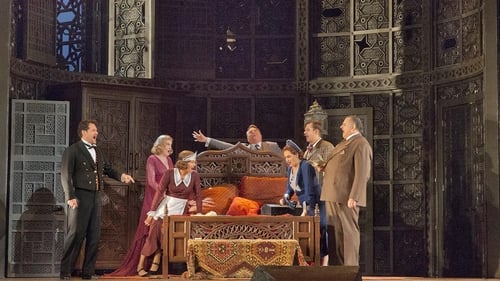
Music Director
Richard Eyre’s elegant production, which opened the Met’s 2014–15 season, sets the action of Mozart’s timeless social comedy in a manor house in 1930s Seville. Ildar Abdrazakov leads the cast as the resourceful Figaro set on outwitting his master, the philandering Count Almaviva, played by Peter Mattei. Marlis Petersen sings Susanna, the object of the Count’s affection and Figaro’s bride-to-be, Amanda Majeski is the Countess, and Isabel Leonard gives a standout performance as the pageboy Cherubino. Music Director James Levine on the podium brings out all the humor, drama, and humanity of Mozart’s score.
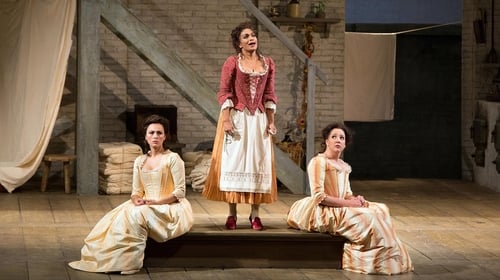
Conductor
Met Music director James Levine conducts a cast of youthful stars in Mozart’s sophisticated comedy about testing the ties of love. Susanna Phillips and Isabel Leonard are the sisters Fiordiligi and Dorabella, who are led to believe their fiancés have gone off to war. Matthew Polenzani and Rodion Pogossov are Ferrando and Guglielmo, the lovers who return in disguise to test their girls' fidelity. Danielle de Niese sings the scheming maid Despina and Maurizio Muraro is Don Alfonso, the philosopher and mastermind pulling the strings.

Music Director
Met Music director James Levine conducts a cast of youthful stars in Mozart’s sophisticated comedy about testing the ties of love. Susanna Phillips and Isabel Leonard are the sisters Fiordiligi and Dorabella, who are led to believe their fiancés have gone off to war. Matthew Polenzani and Rodion Pogossov are Ferrando and Guglielmo, the lovers who return in disguise to test their girls' fidelity. Danielle de Niese sings the scheming maid Despina and Maurizio Muraro is Don Alfonso, the philosopher and mastermind pulling the strings.

Music Director
Music Director James Levine conducts his first new Met production after a two-year absence: Robert Carsen’s hit staging of Verdi’s great human comedy. Ambrogio Maestri is an ideal Falstaff, leading an extraordinary ensemble cast of veteran and up-and-coming Met stars, including Angela Meade (Alice), Stephanie Blythe (Mistress Quickly), Franco Vasallo (Ford), and Jennifer Johnson Cano (Meg). Lisette Oropesa and Paolo Fanale are the young lovers, Nannetta and Fenton.

Conductor
As a storm rages, Siegmund the Wälsung, exhausted from pursuit by enemies in the forest, stumbles into an unfamiliar house for shelter. Sieglinde finds the stranger lying by the hearth, and the two feel an immediate attraction. But they are soon interrupted by Sieglinde's husband, Hunding, who asks the stranger who he is. Calling himself "Woeful," Siegmund tells of a disaster-filled life ("Friedmund darf ich nicht heissen"), only to learn that Hunding is a kinsman of his foes. Hunding, before retiring, tells his guest to defend himself in the morning. Left alone, Siegmund calls on his father, Wälse, for the sword he once promised him. Sieglinde reappears, having given Hunding a sleeping potion.

Conductor
In the depths of the Rhine, the three Rhinemaidens guard the Rhinegold, a treasure of immeasurable value. The Nibelung dwarf Alberich is dazzled by the sight of it. The girls explain that whoever wins the gold and forges it into a ring will gain power over the world, but must first renounce love. Frustrated by his unsuccessful attempts to catch one of the girls, Alberich curses love and steals the gold. Wotan, lord of the gods, is reproached by his wife Fricka: he has promised to give Freia, goddess of youth, to the giants Fasolt and Fafner in return for their building a fortress for the gods. When the giants demand their reward, Loge, the god of fire, suggests an alternative payment: the ring Alberich has forged from the Rhinegold, and his other treasures. The giants agree, and Wotan and Loge leave for the Nibelungs’ underground home.

Conductor
Robert Lepage’s landmark staging of Wagner’s Der Ring des Nibelungen, unveiled over the course of the 2010–11 and 2011–12 seasons, was the first new Met production of the complete cycle in more than 20 years. Combining state-of-the-art technology with traditional storytelling, it brings Wagner’s vision into the 21st century. With Die Walküre, the story of the Ring enters the world of human beings. Jonas Kaufmann and Eva-Maria Westbroek are Siegmund and Sieglinde, the twin children of Wotan, sung by Bryn Terfel. Deborah Voigt stars in the title role of the Valkyrie Brünnhilde, Wotan’s favorite daughter. James Levine conducts.

Music Director
Donizetti’s timeless comedy shines in Otto Schenk’s enchanting production, conducted by James Levine and featuring a remarkable cast. The incomparable Anna Netrebko is Norina, the young widow beloved by Ernesto (a suave Matthew Polenzani), who is about to be disinherited by his miserly uncle, Don Pasquale (John Del Carlo). It takes the clever scheming of Dr. Malatesta (Mariusz Kwiecien) to set things right and to teach the old curmudgeon a lesson—fits of temper, mistaken identities, and all kinds of comic confusion included.

Self - Conductor
Donizetti’s timeless comedy shines in Otto Schenk’s enchanting production, conducted by James Levine and featuring a remarkable cast. The incomparable Anna Netrebko is Norina, the young widow beloved by Ernesto (a suave Matthew Polenzani), who is about to be disinherited by his miserly uncle, Don Pasquale (John Del Carlo). It takes the clever scheming of Dr. Malatesta (Mariusz Kwiecien) to set things right and to teach the old curmudgeon a lesson—fits of temper, mistaken identities, and all kinds of comic confusion included.
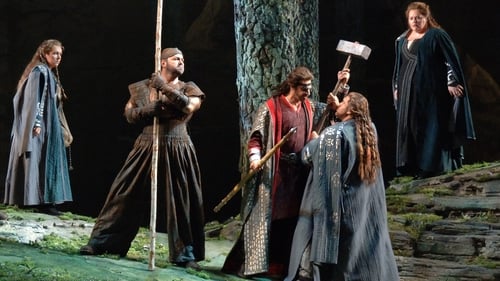
Conductor
Robert Lepage’s landmark staging of Wagner’s Der Ring des Nibelungen, unveiled over the course of the 2010–11 and 2011–12 seasons, was the first new Met production of the complete cycle in more than 20 years. Combining state-of-the-art technology with traditional storytelling, it brings Wagner’s vision into the 21st century. In this first part of the epic, the theft of the Rhinegold treasure sets in motion the course of events that will change the world and end the rule of the gods. Met Music Director James Levine conducts a cast of some of the greatest Wagnerian singers of our time, including Bryn Terfel as Wotan, Stephanie Blythe as Fricka, and Eric Owens as Alberich.

Conductor
Robert Lepage’s landmark staging of Wagner’s Der Ring des Nibelungen, unveiled over the course of the 2010–11 and 2011–12 seasons, was the first new Met production of the complete cycle in more than 20 years. Combining state-of-the-art technology with traditional storytelling, it brings Wagner’s vision into the 21st century. In this first part of the epic, the theft of the Rhinegold treasure sets in motion the course of events that will change the world and end the rule of the gods. Met Music Director James Levine conducts a cast of some of the greatest Wagnerian singers of our time, including Bryn Terfel as Wotan, Stephanie Blythe as Fricka, and Eric Owens as Alberich.

Music Director
Live from the Metropolitan Opera 19 December 2009.

Self - Conductor
Director and choreographer Mark Morris’s production of Gluck’s masterpiece updates the immortal story from its ancient Greek roots to the timeless present, where, he says, “the union of chorus and dancers feels inevitable and inseparable.” With costumes by Isaac Mizrahi and a set designed by Allen Moyer, this production surrounds the action with the superb Met chorus dressed as a crowd of historic characters who bear witness to the transformative power of love. Orfeo (Stephanie Blythe) is so consumed with grief at the death of his beloved Euridice (Danielle de Niese) that the gods (Heidi Grant Murphy as Amor) allow him to lead her back from the underworld—if he will not look at her on the way. Of course he can’t resist looking, but the gods are truly merciful.

Conductor
Director and choreographer Mark Morris’s production of Gluck’s masterpiece updates the immortal story from its ancient Greek roots to the timeless present, where, he says, “the union of chorus and dancers feels inevitable and inseparable.” With costumes by Isaac Mizrahi and a set designed by Allen Moyer, this production surrounds the action with the superb Met chorus dressed as a crowd of historic characters who bear witness to the transformative power of love. Orfeo (Stephanie Blythe) is so consumed with grief at the death of his beloved Euridice (Danielle de Niese) that the gods (Heidi Grant Murphy as Amor) allow him to lead her back from the underworld—if he will not look at her on the way. Of course he can’t resist looking, but the gods are truly merciful.

Music Director
This elegant romance is the least-known work of the mature Giacomo Puccini . The story concerns a kept woman who defies convention to chase a dream of romantic love with an earnest, if naïve, young man. This Met Opera production features the dynamic soprano Angela Gheorghiu and Frenchborn tenor Roberto Alagna performing the roles of Magda and Ruggero, it blooms into its rightful place in the glorious Puccini canon. La Rondine (The Swallow) was commissioned by Vienna s Carltheater in 1913. Due to the impending outbreak of World War I, premiered in 1917, at the Opéra de Monte-Carlo with Gilda Dalla Rizza and Tito Schipa. Set in a Parisian salon, it is the story of Magda, the glamorous mistress of wealthy banker Rambaldo. Her yearning for romantic love compels her into the arms of the ardent and adoring young Ruggero.
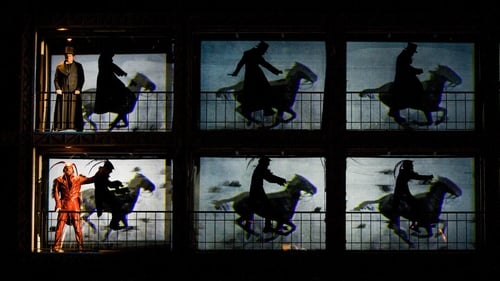
Conductor
Radiant mezzo-soprano Susan Graham and dashing Italian tenor Marcello Giordani are unlucky lovers in La Damnation de Faust, Hector Berlioz’s classic take on dancing with the devil.

Self - Conductor
Radiant mezzo-soprano Susan Graham and dashing Italian tenor Marcello Giordani are unlucky lovers in La Damnation de Faust, Hector Berlioz’s classic take on dancing with the devil.
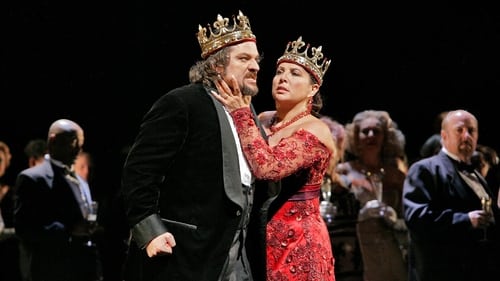
Conductor
Verdi’s admiration for Shakespeare led to such masterpieces as Othello and Falstaff, and if the earlier Macbeth isn’t on their exalted level it’s still a powerfully dramatic opera that hews closely to the original’s story line. The MET’s production retains the dark aura of the opera while updating it to a vaguely post-modern context. So the witches are bag ladies in various stages of decrepitude, with children in tow. The Banquet Scene features lowered chandeliers, a plethora of chairs, and a slew of extras dressed in tuxedos and party gowns. Macbeth sports a leather coat, the soldiers are in drab brown uniforms and seem to have fingers on their triggers even when they’re supposed to be in non-threatening situations. Director Adrian Noble also has Lady Macbeth do an inordinate amount of writhing around and singing from a lying-down position, adding to the feeling that a less interventionist directorial hand might have generated more impact.
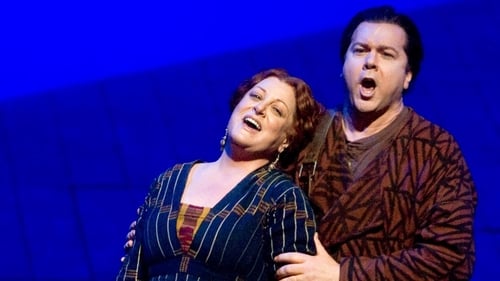
Conductor
James Levine’s love for this monumental opera shimmers throughout this exciting performance. It was an afternoon to remember: Met favorite Deborah Voigt singing her first run as the proud Irish princess opposite tenor Robert Dean Smith—making an astonishing Met debut in front of a live worldwide movie-theater audience. Michelle DeYoung was a sisterly Brangäne and Matti Salminen an imposing King Marke.
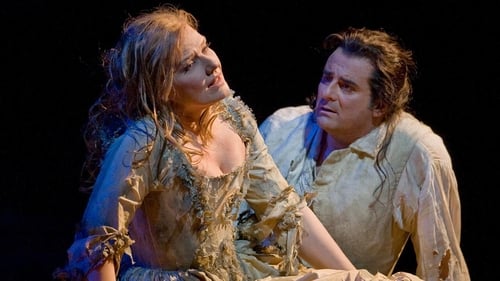
Conductor
One of today’s most compelling singing actresses, Karita Mattila takes on the irresistible role of Manon Lescaut, the headstrong young woman torn between a life of luxury and the call of her true love: the Chevalier des Grieux, played by Marcello Giordani. The young Puccini lavished some of his most sensual music on this early hit, conducted here by the Met’s beloved James Levine.

Conductor
Tamino, a handsome prince, and Papageno, a bird-catcher, are sent by the Queen of Night to rescue her daughter Pamina from captivity under the high priest Sarastro. Julie Taymor's abridged, English-language production of the classic Mozart opera.

Director
Two years prior to the opening scene, the nobleman Florestan has exposed or attempted to expose certain crimes of the nobleman Pizarro. In revenge, Pizarro has secretly imprisoned Florestan in the prison over which Pizarro is governor. The jailer of the prison, Rocco, has a daughter, Marzelline, and a servant (or assistant), Jaquino. Florestan’s wife, Leonore, came to Rocco’s door dressed as a boy seeking employment, and Rocco hired her. On orders, Rocco has been giving Florestan diminishing rations until he is nearly starved to death. Place: A Spanish state prison, a few miles from Seville; Time: Late 18th century.

Elijah Moshinsky’s witty production deftly walks the line between the lighthearted humor and the profound philosophical underpinnings of Strauss and Hofmannsthal’s opera, masterfully conducted here by Met Music Director James Levine. Deborah Voigt stars as Ariadne, the mythical heroine abandoned on the island of Naxos by her lover, and Richard Margison is Bacchus, the young god who eventually takes her away to a new life. The spectacular Natalie Dessay as Zerbinetta leads the troupe of comedians who unsuccessfully try to cheer Ariadne up. Susanne Mentzer is delightful as the young Composer of the opera-within-the-opera, and Wolfgang Brendel sings the Music Master.

Conductor
James Morris leads an all-star cast including Karita Mattila, Ben Heppner, Thomas Allen and René Pape, in this production of Wagner's comic opera, recorded live at New York's Metropolitan Opera in 2001. James Levine conducts.

Music Director
Nabucco - live from Metropolitan Opera, June 2002. On its surface, Nabucco is about the epic struggle of Zaccaria and the Jews suppressed by Babylon’s King Nebuchadnezzar and his vengeful daughter, Abigaille. But to Italians fighting for their freedom from Austria, Verdi’s first great opera was an inspiring call to arms.

Conductor
Live performance at the Metropolitan Opera in 2000.

Himself
A documentary on the making of Fantasia 2000.

Conductor
Mozart’s allegorical fairy tale has charmed audiences and inspired artists, for more than 200 years. A few weeks before this telecast, the Met unveiled a new production of the opera featuring the colorful designs of acclaimed artist David Hockney. His bold colors and vivid images enchanted audiences and seemed to inspire the striking cast, led by James Levine’s affectionate conducting. Francisco Araiza is the young prince Tamino, who finds himself in a strange land, forced to undergo mysterious tests so he can rescue, then marry, the woman he loves, Pamina, played by Kathleen Battle. Kurt Moll is the compassionate Sarastro and Luciana Serra is the Queen of the Night.

Music Director
When Act 2 of Fidelio is being poured out in the most glorious tones imaginable from Mattila, Heppner and Pape - who can possibly complain? Who would honestly want to replace any of them? Who can fail to be overwhelmed with gratitude to own this disc? If I continue to count our blessings, I might mention the splendid Robert Lloyd drawing us to a thrilling finale as Don Fernando; and Falk Struckmann a convincingly evil Pizarro. So it is certainly not complaining, but fulfilling a reviewer's obligation to tell all, when I admit that Jennifer Welch-Babidge is little more than adequate as Marzelline. One might wish for a purer vocal line in this role - like a Bonney or an Isokoski.
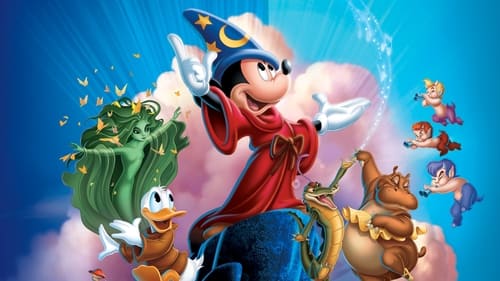
Conductor
O clássico de 1940 da Walt Disney Pictures, Fantasia, retorna com um um toque a mais de magia tecnológica. Combinando animação tradicional com gerada por computador, este musical de gala apresenta seis novos segmentos, cada um criado por diretores e equipes criativas diferentes.

Self - Host
O clássico de 1940 da Walt Disney Pictures, Fantasia, retorna com um um toque a mais de magia tecnológica. Combinando animação tradicional com gerada por computador, este musical de gala apresenta seis novos segmentos, cada um criado por diretores e equipes criativas diferentes.

Art Direction
Inspired by Wagner’s own tortured affair with the wife of his patron, this searing masterwork is based on Arthurian legend and tells of an illicit romance between a Breton nobleman and the Irish princess betrothed to his uncle and king. The composer’s larger-than-life sensibilities are on full display throughout the score: Along with intoxicating orchestral music that surges in tandem with the couple’s burgeoning passion and a chord left symbolically unresolved until the last moments of the opera, the opera also features one of the repertory’s most soaring and ecstatic final climaxes, as Isolde surrenders to a love so powerful that she transcends life itself.

Conductor
Inspired by Wagner’s own tortured affair with the wife of his patron, this searing masterwork is based on Arthurian legend and tells of an illicit romance between a Breton nobleman and the Irish princess betrothed to his uncle and king. The composer’s larger-than-life sensibilities are on full display throughout the score: Along with intoxicating orchestral music that surges in tandem with the couple’s burgeoning passion and a chord left symbolically unresolved until the last moments of the opera, the opera also features one of the repertory’s most soaring and ecstatic final climaxes, as Isolde surrenders to a love so powerful that she transcends life itself.

Self - Conductor
Inspired by Wagner’s own tortured affair with the wife of his patron, this searing masterwork is based on Arthurian legend and tells of an illicit romance between a Breton nobleman and the Irish princess betrothed to his uncle and king. The composer’s larger-than-life sensibilities are on full display throughout the score: Along with intoxicating orchestral music that surges in tandem with the couple’s burgeoning passion and a chord left symbolically unresolved until the last moments of the opera, the opera also features one of the repertory’s most soaring and ecstatic final climaxes, as Isolde surrenders to a love so powerful that she transcends life itself.

Conductor
Celebrating a great artist is always a gala occasion, but when the honoree is the legendary Luciano Pavarotti, the event is one to treasure. To pay tribute to the 30th anniversary of Pavarotti’s Met debut, the company featured him in fully staged excerpts of three operas: Act II of Donizetti’s L’Elisir d’Amore, Act III of Puccini’s La Bohème (the opera he sang at his debut), and Act IV of Verdi’s Aida. Joining the superstar tenor were colleagues like Ruth Ann Swenson, Leo Nucci, Daniela Dessì, Maria Guleghina, and Dolora Zajick, all conducted by James Levine.
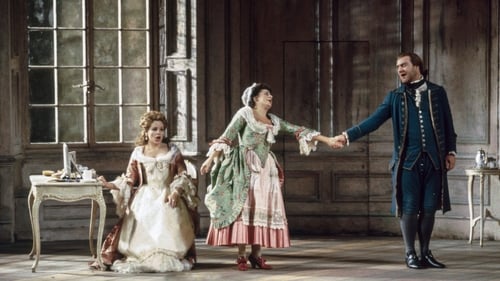
Conductor
The Met assembled a vocal dream team for Jonathan Miller’s stylish production of the eternal Mozart masterpiece: Renée Fleming as the Countess, Cecilia Bartoli as Susanna, and Bryn Terfel as Figaro. With James Levine—one of the world’s great conductors of Mozart—in the pit, Bartoli interpolating two rarely heard alternate arias, and Dwayne Croft as the Count and Susanne Mentzer as Cherubino, this is a performance for the record books.

Music Director
A timeless tale told in a florid bel canto style, Rossini’s take on the Cinderella story offers an ideal propellant for a virtuosic mezzo-soprano to rocket from rags to riches. But in this retelling, the supporting characters soar just as high: Cinderella’s Prince, her stepfather, and the Prince’s valet are given memorable arias, and the composer rounds out his score with ingenious ensemble flourishes. A vivacious masterpiece, La Cenerentola brings stock fairy tale characters to dazzling life.

Music Director
Live performance from the Metropolitan Opera, 25 March 1997.

Conductor
With James Levine at the helm, Verdi’s multi-faceted masterpiece is revealed as a drama of almost Shakespearean proportions. Superstar Plácido Domingo takes on he demanding role of Don Alvaro, the outcast whose noble gesture unwittingly sets the wheels of fate in motion and destroys an entire family. Sharon Sweet is Leonora, the woman he loves, and Vladimir Chernov singe her vengeful brother Don Carlo, whose twisted hate is all-consuming. Roberto Scandiuzzi is the benevolent Padre Guardiano.

Conductor
This live from the Met telecast from October 1996 of Giordano’s infrequently performed verismo gem is an absolute pleasure to watch and listen to and I highly recommend it. Nicholas Joel’s production is extremely elegant while at the same time being simple and uncluttered. Act I, for example, is dominated by an enormous gilt-framed mirror precariously tilted. I assume that it is a metaphor for the imminent downfall of the decadent aristocracy at the party given by the Contessa di Coigny. The costumes designs by Hubert Monloup are terrific. The prerevolutionary costumes in Act I are simply stunning each one individually tailored for the choristers and major performers.

Self
This film was prepared as a introduction to a series of opera broadcasts on German television. It depicts the behind-the-scenes manoeuvrings in preparation for the annual opera festival in Bayreuth.

conductor
This tribute to James Levine, first shown on PBS, was only part of that glorious evening. Here we have the whole performance, up to three hours. I could not stop watching these discs. Let me say this much; Levine has done for the Met, making it the premier opera house in the world, what Karajan did with the Berlin, making it one of the finest orchestras ever. So sit back and enjoy.

Music Director
Live performance from the Metropolitan Opera, 27 February, 1996.

Director
Verdi’s monumental score is fully the equal of Shakespeare’s famous tragedy—and both demand great actors. This is one performance where both playwright and composer are well served. Plácido Domingo’s Otello is one of the glories of the operatic world, beautifully sung and so commandingly acted that audiences are devastated by the end. Renée Fleming’s ravishingly beautiful Desdemona is deeply moving, and as Iago, James Morris is as beguiling as he is menacing. Under James Levine’s conducting the Met orchestra and chorus are vital characters in the drama.

Conductor
Verdi’s monumental score is fully the equal of Shakespeare’s famous tragedy—and both demand great actors. This is one performance where both playwright and composer are well served. Plácido Domingo’s Otello is one of the glories of the operatic world, beautifully sung and so commandingly acted that audiences are devastated by the end. Renée Fleming’s ravishingly beautiful Desdemona is deeply moving, and as Iago, James Morris is as beguiling as he is menacing. Under James Levine’s conducting the Met orchestra and chorus are vital characters in the drama.
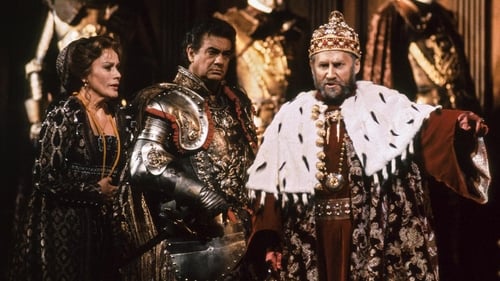
Art Direction
This evocative production by Giancarlo Del Monaco sumptuously captures the look and feel of 14th century Genoa and is a perfect compliment to Verdi’s setting of this story of searing conflict between public duty and private grief. Plácido Domingo is Gabriele Adorno, sworn enemy of the doge of Genoa, Simon Boccanegra (Vladimir Chernov). Gabriele is in love with the beautiful Amelia (Kiri Te Kanawa at her most affecting) who turns out to be none other than the long-lost daughter the doge. James Levine’s authoritative conducting of the Met orchestra and chorus reveals the dark power of Verdi’s score. Performed January 26th, 1995.

Self - Conductor
This evocative production by Giancarlo Del Monaco sumptuously captures the look and feel of 14th century Genoa and is a perfect compliment to Verdi’s setting of this story of searing conflict between public duty and private grief. Plácido Domingo is Gabriele Adorno, sworn enemy of the doge of Genoa, Simon Boccanegra (Vladimir Chernov). Gabriele is in love with the beautiful Amelia (Kiri Te Kanawa at her most affecting) who turns out to be none other than the long-lost daughter the doge. James Levine’s authoritative conducting of the Met orchestra and chorus reveals the dark power of Verdi’s score. Performed January 26th, 1995.

Conductor
This evocative production by Giancarlo Del Monaco sumptuously captures the look and feel of 14th century Genoa and is a perfect compliment to Verdi’s setting of this story of searing conflict between public duty and private grief. Plácido Domingo is Gabriele Adorno, sworn enemy of the doge of Genoa, Simon Boccanegra (Vladimir Chernov). Gabriele is in love with the beautiful Amelia (Kiri Te Kanawa at her most affecting) who turns out to be none other than the long-lost daughter the doge. James Levine’s authoritative conducting of the Met orchestra and chorus reveals the dark power of Verdi’s score. Performed January 26th, 1995.

Music Director
Puccini's Il Tabarro & Leoncavallo's Pagliacci; Pavarotti and Domingo star in MET 1994-1995 season opener.

Conductor
Puccini's Il Tabarro & Leoncavallo's Pagliacci; Pavarotti and Domingo star in MET 1994-1995 season opener.

Conductor
The Otto Schenk production of Richard Strauss's "Elektra", filmed live at the Metropolitan Opera in January, 1994. Hildegard Behrens stars as Elektra, with Deborah Voigt as Chrysothemis, Brigitte Fassbaender as Klytämnestra, Donald McIntyre as Orest, and James King as Aegisth. James Levine conducts.

Conductor
James Levine’s love for this seldom-heard score infuses every measure of Verdi’s music. Superstar Luciano Pavarotti heads the cast as the Muslim warrior prince Oronte who converts to Christianity out of love for the Italian Giselda (Lauren Flanigan)—before dying of the wounds he received in battling the Crusaders. Samuel Ramey is the Crusader-turned-hermit Pagano. Mark Lamos’s striking production has sets by John Conklin and costumes by Dunya Ramicova.

Music Director
Giuseppe Verdi's opera of religion, revenge and redemption gets the star treatment in this 1993 Metropolitan Opera production conducted by James Levine and starring Plácido Domingo as the cuckolded man of God at the center of the tale. Sharon Sweet sings the role of Domingo's adulteress wife and Vladimir Chernov plays the vengeful father in this rarely staged gem directed by Giancarlo del Monaco and filmed by Brian Large.
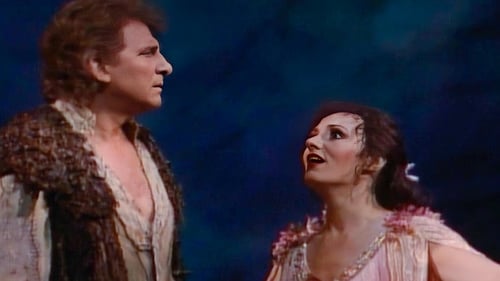
Art Direction
The Met production easily has the most beautiful staging, designed by Otto Schenck, who also produced the fabulous set for the Met's previous Ring cycle. Kurt Moll is a wonderful Gurnemanz, but compared to his studio recording under Karajan a decade earlier it has lost some of its original velvety body and luster. As Parsifal, Jerusalem is starting to show some wear and tear on his voice at the Met in 1992 as opposed to his prime form at Bayreuth in 1981, but is still quite good; only Placido Domingo could compete with him in the role at that time.

Conductor
The Met production easily has the most beautiful staging, designed by Otto Schenck, who also produced the fabulous set for the Met's previous Ring cycle. Kurt Moll is a wonderful Gurnemanz, but compared to his studio recording under Karajan a decade earlier it has lost some of its original velvety body and luster. As Parsifal, Jerusalem is starting to show some wear and tear on his voice at the Met in 1992 as opposed to his prime form at Bayreuth in 1981, but is still quite good; only Placido Domingo could compete with him in the role at that time.

Self - Conductor
The Met production easily has the most beautiful staging, designed by Otto Schenck, who also produced the fabulous set for the Met's previous Ring cycle. Kurt Moll is a wonderful Gurnemanz, but compared to his studio recording under Karajan a decade earlier it has lost some of its original velvety body and luster. As Parsifal, Jerusalem is starting to show some wear and tear on his voice at the Met in 1992 as opposed to his prime form at Bayreuth in 1981, but is still quite good; only Placido Domingo could compete with him in the role at that time.

Art Direction
It is to composer and librettist Arrigo Boito and his constant pestering of the octogenarian Verdi that there remained within him one last great comedy fighting to get out that we owe this absolute miracle of an opera. Produced in 1893 as Verdi turned 80 there is much in this masterpiece that can be identified as a modernist neoclassical work. The use of short motifs instead of long arioso melodic lines, the spry and reduced orchestral textures and the lack of a single 'stand and deliver' dramatic declamatory aria all serve to make this more of a 20th century work than an example of 19th century late-Romanticism.

Conductor
It is to composer and librettist Arrigo Boito and his constant pestering of the octogenarian Verdi that there remained within him one last great comedy fighting to get out that we owe this absolute miracle of an opera. Produced in 1893 as Verdi turned 80 there is much in this masterpiece that can be identified as a modernist neoclassical work. The use of short motifs instead of long arioso melodic lines, the spry and reduced orchestral textures and the lack of a single 'stand and deliver' dramatic declamatory aria all serve to make this more of a 20th century work than an example of 19th century late-Romanticism.

Self - Conductor
It is to composer and librettist Arrigo Boito and his constant pestering of the octogenarian Verdi that there remained within him one last great comedy fighting to get out that we owe this absolute miracle of an opera. Produced in 1893 as Verdi turned 80 there is much in this masterpiece that can be identified as a modernist neoclassical work. The use of short motifs instead of long arioso melodic lines, the spry and reduced orchestral textures and the lack of a single 'stand and deliver' dramatic declamatory aria all serve to make this more of a 20th century work than an example of 19th century late-Romanticism.
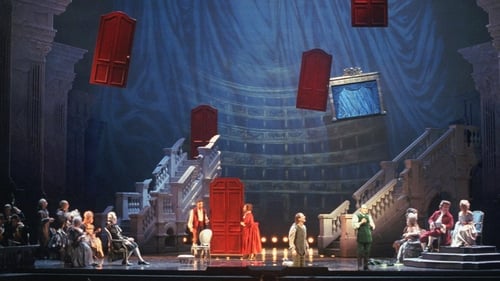
Conductor
What happened to Figaro and his friends after the events told in Rossini’s and Mozart’s operas? One possible sequel is told in John Corigliano’s “grand opera buffa” The Ghosts of Versailles—an uproariously funny and deeply moving work inspired by Beaumarchais’s third Figaro play, La Mère Coupable, and commissioned by the Met to celebrate its 100th anniversary. This telecast captures its world premiere run, conducted by James Levine. Håkan Hagegård is Beaumarchais, Figaro’s creator, who is deeply in love with Marie Antoinette (Teresa Stratas in a heart-searing performance) and determined to rewrite history and save her from the guillotine. A young Renée Fleming, at the beginning of her international career, sings the unfaithful Rosina. Gino Quilico is the wily Figaro who tries to take matters in his own hands, and Marilyn Horne stops the show as the exotic entertainer Samira.

Art Direction
John Copley’s colorful production, with designs by Beni Montresor, was created around the beloved superstar Luciano Pavarotti. As the simple, good-hearted Nemorino, he enchanted audiences with his larger-than-life personality as well as his golden voice. Enzo Dara as the quack Dr. Dulcamara provides the elixir of the title that helps Nemorino win the heart of Adina, the girl of his dreams, sung with youthful energy by Kathleen Battle.

Conductor
John Copley’s colorful production, with designs by Beni Montresor, was created around the beloved superstar Luciano Pavarotti. As the simple, good-hearted Nemorino, he enchanted audiences with his larger-than-life personality as well as his golden voice. Enzo Dara as the quack Dr. Dulcamara provides the elixir of the title that helps Nemorino win the heart of Adina, the girl of his dreams, sung with youthful energy by Kathleen Battle.

Self - Conductor
John Copley’s colorful production, with designs by Beni Montresor, was created around the beloved superstar Luciano Pavarotti. As the simple, good-hearted Nemorino, he enchanted audiences with his larger-than-life personality as well as his golden voice. Enzo Dara as the quack Dr. Dulcamara provides the elixir of the title that helps Nemorino win the heart of Adina, the girl of his dreams, sung with youthful energy by Kathleen Battle.

Music Director
Verdi's opera performed by the Metropolitan Opera Orchestra and Chorus, conducted by James Levine.

Conductor
Verdi's opera performed by the Metropolitan Opera Orchestra and Chorus, conducted by James Levine.

Music
In ancient Babylon, SEMIRAMIDE (Anderson) encourages her lover Assur (Ramey) to murder her husband, King Ninus. Her son, Ninius, disappears, believed dead, and Semiramide rules in her own right. 15 years later, as the opera opens, she is about to announce the name of her successor. Idreno (Olsen) and Assur are the leading candidates for the throne and the hand of Princess Azema (Shin), but Semiramide has taken a fancy to young Arsace (Horne), her victorious military leader who has been summoned back to Babylon. Only the high priest Oroe (Cheek) knows that Arsace is actually Ninius, spirited away to safety after the coup. As the queen announces Arsace as her successor, the ghost of her husband appears from his tomb, demanding that Arsace punish the late king’s murderers... Filmed at New York's Metropolitan Opera, John Copley's production of Rossini's last, longest and most elaborate dramatic opera brings together what many consider the definitive contemporary cast.

Conductor
"Spirituals in Concert" featuring Jessye Norman and Kathleen Battle.

Music Director
The stupendous climax to Wagner’s four-part Ring cycle is brilliantly realized by the Otto Schenk/Günther Schneider-Siemssen production and byJames Levine’s monumental conducting. The Met orchestra, chorus, and an all-star cast make this Götterdämmerung one that truly rises to the occasion. Hildegard Behrens’s Brünnhilde must be experienced to be believed, as does Matti Salminen’s richly sung, domineering Hagen. At the center of the drama is Siegfried Jerusalem as Siegfried, who does not realize he has been drawn into a plot of betrayal until it is too late. Christa Ludwig is magnetic as Waltraute and Ekkehard Wlaschiha is a compelling Alberich.

Conductor
From the gorgeous scene deep in the river Rhine that opens the opera, up to the magic Rainbow Bridge that appears at the end, leading to a glistening Valhalla, Otto Schenk’s production captures the scenic world of Wagner’s Ring as brilliantly as James Levine and the Met orchestra capture the musical world. The cast is incomporable: an astounding James Morris as the young god Wotan, the great Christa Ludwig as his wife Fricka, incandescent Siegfried Jerusalem as Loge, the wily god of fire, and Ekkehard Wlaschiha as a complex Alberich.

Music
Every woman wants him, every man wants to be him: Mozart’s version of the irresistible rogue who brings excitement with him and leaves destruction it his wake has always attracted top singing actors, as in this performance brilliantly led by James Levine. Samuel Ramey is Don Giovanni, pursued by the incandescent Karita Mattila (Donna Elvira) in her Met debut season and role, and by the white-hot avenging fury of Carol Vaness (Donna Anna.) Ferruccio Furlanetto delivers a masterful comic turn as the Don’s servant, Leporello.

Conductor
Siegfried is the third of the four operas that constitute Der Ring des Nibelungen (The Ring of the Nibelung), by Richard Wagner.
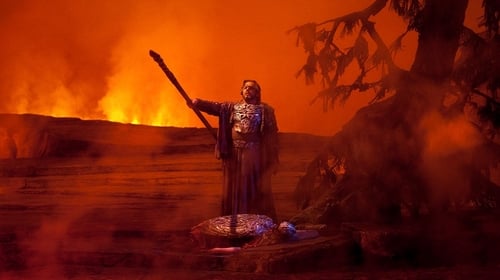
Self - Conductor
The gorgeous and evocative Otto Schenk/Günther Schneider-Siemssen production continues with this second opera in Wagner’s Ring cycle. Hildegard Behrens brings deep empathy to Brünnhilde, the favorite daughter of the god Wotan (James Morris) who nevertheless defies him. Morris’s portrayal of Wotan is deservedly legendary, as is Christa Ludwig, as Fricka. Jessye Norman and Gary Lakes are Sieglinde and Siegmund, and Kurt Moll is the threatening Hunding. James Levine and the Met orchestra provide astonishing color and drama. (Performed April 8, 1989)

Music Director
Siegfried is the third of the four operas that constitute Der Ring des Nibelungen (The Ring of the Nibelung), by Richard Wagner.

Music Director
The gorgeous and evocative Otto Schenk/Günther Schneider-Siemssen production continues with this second opera in Wagner’s Ring cycle. Hildegard Behrens brings deep empathy to Brünnhilde, the favorite daughter of the god Wotan (James Morris) who nevertheless defies him. Morris’s portrayal of Wotan is deservedly legendary, as is Christa Ludwig, as Fricka. Jessye Norman and Gary Lakes are Sieglinde and Siegmund, and Kurt Moll is the threatening Hunding. James Levine and the Met orchestra provide astonishing color and drama. (Performed April 8, 1989)

Conductor
A filmed concert of two famed sopranos.

Music
AIDA, an Ethiopian princess, is captured and brought into slavery in Egypt. A military commander, Radamès, struggles to choose between his love for her and his loyalty to the Pharaoh. To complicate the story further, Radamès is loved by the Pharaoh's daughter Amneris, although he does not return her feelings. Sonja Frisell’s production captures all the grandeur and excitement of Verdi’s monumental opera, particularly the great triumphal scene where the Egyptian army, led by Radamès (Plácido Domingo), returns victorious from war. Aprile Millo is Aida, the slave girl whose love for Radamès has her squaring off with Amneris (Dolora Zajick), the Egyptian princess who also loves him. Sherrill Milnes is Amonasro, and James Levine leads The Metropolitan Opera Orchestra, Chorus, and Ballet.
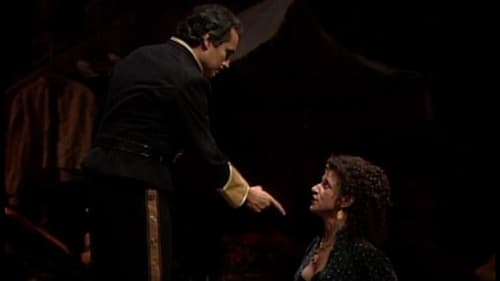
Conductor
This all-star cast is framed by Peter Hall’s gritty, realistic production and conducted by James Levine, who brings out all the surging emotion and gripping drama in Bizet’s score. At the center of the story is Agnes Baltsa, whose smoky mezzo is tailor-made for the gypsy Carmen, an independent woman who glories in obeying only her own rules, but who is haunted by fate. Superstar tenor José Carreras is Don José, the solider from a small town who catches Carmen’s eye and is destroyed by his growing obsession with her. Samuel Ramey is the charismatic matador Escamillo, who lures Carmen away from Don José with tragic result. Leona Mitchell is Micaëla, the simple girl from Don José’s hometown who cannot save him. March 21, 1987 Matinee Broadcast.
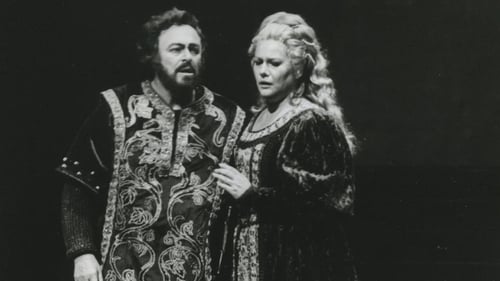
Luciano Pavarotti brings his spectacular voice and artistry to one of the most famous of all tenor roles—Manrico, the ardent troubadour, trapped in an impossible situation by forces beyond his control. The sensational Dolora Zajick, only days after her Met debut, gives an incandescent performance as the demented gypsy Azucena, thirsting for revenge against Count Di Luna (Sherrill Milnes). Eva Marton is the passionate Leonora, desired by both Manrico and the Count, and James Levine brilliantly leads the Met’s orchestra and chorus in some of Verdi’s best-known music.

Art Direction
Luciano Pavarotti brings his spectacular voice and artistry to one of the most famous of all tenor roles—Manrico, the ardent troubadour, trapped in an impossible situation by forces beyond his control. The sensational Dolora Zajick, only days after her Met debut, gives an incandescent performance as the demented gypsy Azucena, thirsting for revenge against Count Di Luna (Sherrill Milnes). Eva Marton is the passionate Leonora, desired by both Manrico and the Count, and James Levine brilliantly leads the Met’s orchestra and chorus in some of Verdi’s best-known music.

Conductor
Luciano Pavarotti brings his spectacular voice and artistry to one of the most famous of all tenor roles—Manrico, the ardent troubadour, trapped in an impossible situation by forces beyond his control. The sensational Dolora Zajick, only days after her Met debut, gives an incandescent performance as the demented gypsy Azucena, thirsting for revenge against Count Di Luna (Sherrill Milnes). Eva Marton is the passionate Leonora, desired by both Manrico and the Count, and James Levine brilliantly leads the Met’s orchestra and chorus in some of Verdi’s best-known music.

Conductor
It's hard to imagine confirmed Straussians not wanting this starry Metropolitan Opera performance of Elektra. Strauss and his librettist, Hugo von Hofmannstahl, transformed Sophocles' take on Homer's tale into a harrowing opera noir. Elektra lives for one reason, to kill her mother, Klytämnestra, and her stepfather, Aegisth, the murderers of her father, Agamemnon. In contrast to Elektra's vengeful obsession, her sister Chrysothemis desires to get on with life. When their long-missing brother, Orestes, returns to do the deed, Elektra celebrates with a dance of death and, her sole purpose in life fulfilled, dies. Strauss joined the hermetic plot to music of the utmost opulence, violent and yearning by turns, evoking the cardinal principles of Greek tragedy - pity and terror.

Jessye Norman is a regal Ariadne, the mythological Greek heroine in this opera-within-an-opera, opposite the passionate Bacchus of the great James King. Kathleen Battle delivers the coloratura fireworks of Zerbinetta, the leader of a commedia dell’arte troupe that finds itself stranded on Ariadne’s island. Tatiana Troyanos and Franz Ferdinand Nentwig star as the young Composer and the Music Master in the opera’s prologue. James Levine brings out all the color and charm of Strauss’s brilliant chamber-sized score with its equal amounts of pathos and humor. Bodo Igesz’s production features sets by esteemed designer Oliver Messel.

Conductor
Jessye Norman is a regal Ariadne, the mythological Greek heroine in this opera-within-an-opera, opposite the passionate Bacchus of the great James King. Kathleen Battle delivers the coloratura fireworks of Zerbinetta, the leader of a commedia dell’arte troupe that finds itself stranded on Ariadne’s island. Tatiana Troyanos and Franz Ferdinand Nentwig star as the young Composer and the Music Master in the opera’s prologue. James Levine brings out all the color and charm of Strauss’s brilliant chamber-sized score with its equal amounts of pathos and humor. Bodo Igesz’s production features sets by esteemed designer Oliver Messel.

Music Director
The Franco Zeffirelli production of Puccini's "Turandot", recorded live at the Metropolitan Opera in April, 1987. Éva Marton stars as Turandot, with Plácido Domingo as Calaf, Leona Mitchell as Liù, Paul Plishka as Timur, and Hugues Cuenod as L'Imperatore Altoum. James Levine conducts.

Music Director
L'ITALIANA IN ALGERI is an operatic dramma giocoso in two acts by Gioachino Rossini to an Italian libretto by Angelo Anelli. Rossini composed L'italiana in Algeri when he was 21 in either 18 or 27 days, depending on which source one believes (Rossini, not surprisingly, pegged it at 18). It premiered at the Teatro San Benedetto in Venice on 22 May 1813. The music is characteristic of Rossini's style, remarkable for its fusion of sustained, manic energy with elegant, pristine melodies. The plot, in brief: Isabella’s lover Lindoro has been kidnapped, and in her search for him she is shipwrecked and taken captive by Mustafa, Bey of Algiers. To her amazement and delight, she finds Lindoro among the Bey’s prisoners. Isabella hatches a plot that involves flirtation and stealth, and together she and Lindoro escape. Marilyn Horne, Pablo Montarsolo, Douglas Ahistedt, and Allan Monk star in this legendary Metropolitan Opera production conducted by James Levine.
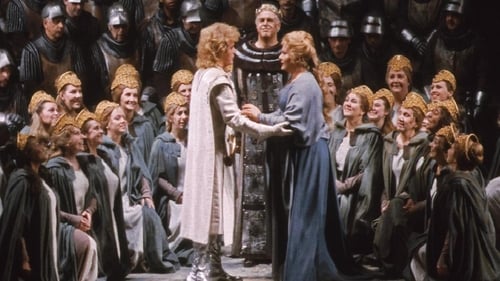
Conductor
Wagner’s Romantic opera demands singing actors who can truly inhabit their parts, and that’s just what we have here. Is it possible for a Knight of the Holy Grail to look more enticing than Peter Hofmann? No wonder Elsa (Eva Marton) falls in love at first sight. Marton’s heroine is innocent, but she is also a passionate, real-life young woman—which is good, because Leonie Rysanek is positively demented as Ortrud, the sorceress who accuses Elsa and Lohengrin of using magic. With James Levine’s superb conducting, the orchestra and chorus are similarly magical.

Conductor
From the "James Levine: Celebrating 40 Years at the Met" DVD box set. Jean-Pierre Ponnelle’s landmark production of Mozart’s most human comedy provides the perfect setting for this superb cast under James Levine’s ebullient leadership. The philandering and arrogant Count Almaviva (Thomas Allen) is no match for his wily servant Figaro (Ruggero Raimondi), whose soon-to-be-wife Susanna (Kathleen Battle) is as manipulative as she is charming. Add in one beautiful, disillusioned Countess (Carol Vaness) and one irrepressible, testosterone-laden teenage boy (Cherubino, played by Federica von Stade), and it’s no wonder some critics say this is the perfect opera.

Art Direction
Live Metropolitan Opera performance March, 1985.

Music Director
This was one of the most emotional evenings in Met history—the night Leontyne Price bid farewell to opera. Aida is the role that inspired audiences around the world to acclaim her as the greatest Verdi soprano of her time. And this telecast shows why: the famous soaring phrases that seemed to never end, the shimmering top to her lustrous voice, undimmed by the years. But most of all, there is the ennobling heart and soul Price lavished on every performance—captured here forever. With James Levine conducting the Met orchestra, chorus, and ballet.

Music Director
Live from the Metropolitan Opera: Simon Boccanegra

Conductor
Live performance at the Metropolitan Opera, 1984. James Levine conducting Metropolitan Opera Orchestra and Chorus. Stage direction by Piero Faggioni.

Conductor
Leonora plans to elope with Don Alvaro, but he accidentally shoots and kills her father, who curses them as he dies. The lovers go on the run, but get separated. Bent on revenge, Leonora's brother Don Carlo, hunts them down.
Verdi painted an immense canvas with this dark but tuneful opera, vividly brought to life in John Dexter’s production, with sets by the great Eugene Berman. The legendary Leontyne Price is seen in one of her greatest roles, Leonora. Price’s soaring voice encompasses every nuance of Leonora’s emotion as she moves from joy through resignation to ultimate heartbreak. James Levine’s brilliant leading of the Met orchestra and chorus is a lesson in Verdi style. Giuseppe Giacomini is Alvaro, the man Leonora loves, and Leo Nucci is Don Carlo, the dark instrument of their Fate.

Self - Conductor
Leonora plans to elope with Don Alvaro, but he accidentally shoots and kills her father, who curses them as he dies. The lovers go on the run, but get separated. Bent on revenge, Leonora's brother Don Carlo, hunts them down.
Verdi painted an immense canvas with this dark but tuneful opera, vividly brought to life in John Dexter’s production, with sets by the great Eugene Berman. The legendary Leontyne Price is seen in one of her greatest roles, Leonora. Price’s soaring voice encompasses every nuance of Leonora’s emotion as she moves from joy through resignation to ultimate heartbreak. James Levine’s brilliant leading of the Met orchestra and chorus is a lesson in Verdi style. Giuseppe Giacomini is Alvaro, the man Leonora loves, and Leo Nucci is Don Carlo, the dark instrument of their Fate.

Conductor
Verdi's early masterpiece is based on a Victor Hugo play with a complicated plot concerning a young woman and the three men vying for her affections—her elderly uncle, a king destined to become Holy Roman Emperor, and a bandit who is actually an overthrown nobleman. Though there is plenty of action arising from the various passions and grudges scattered among these characters, the opera is best appreciated as a feast of beautiful and dramatic Italianate singing. With virtuosic roles for a quartet of principals, the opera delivers one feat of heroic vocalism after another.

Conductor
Berlioz’s colossal masterpiece requires stupendous forces—dozens of soloists, enormous chorus, orchestra and ballet, a superb conductor who understands the uniqueness of the score—plus a production that does visual justice to the work. “A stupendous achievement” was one critic’s assessment of Peter Wexler’s inventive production. And with James Levine’s wizardry galvanizing the marvelous all-star cast, this is truly a gem. Plácido Domingo is the legendary hero Aeneas, Jessye Norman the obsessed prophetess Cassandra, and Tatiana Troyanos is Queen Dido, who commits suicide when Aeneas leaves her.

Conductor
Berlioz’s colossal masterpiece requires stupendous forces—dozens of soloists, enormous chorus, orchestra and ballet, a superb conductor who understands the uniqueness of the score—plus a production that does visual justice to the work. “A stupendous achievement” was one critic’s assessment of Peter Wexler’s inventive production. And with James Levine’s wizardry galvanizing the marvelous all-star cast, this is truly a gem. Plácido Domingo is the legendary hero Aeneas, Jessye Norman the obsessed prophetess Cassandra, and Tatiana Troyanos is Queen Dido, who commits suicide when Aeneas leaves her.
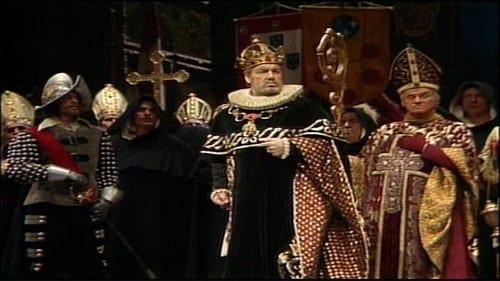
Conductor
Ghiaurov, Freni, and Bumbry were great voices in their time, and they are still effective here -- good enough musicians to put over the quite heavy vocal and expressive demands of their roles. Louis Quilico was never quite in that league, and he sounds a bit spread and woofy in places here, but he works hard and effectively to bring Rodrigo to life. Placido Domingo recorded his first Don Carlo, for EMI with Giulini, about 15 years before this production, but he looks and sounds fine here -- in the early 1980's he was doing very good Otellos and Lohengrins too, and Furlanetto, still in his 30's, brings a rich, young voice to an old part and succeeds in making the Grand Inquisitor vocally as well as expressively formidable. Levine brings both weight and energy to the score, and that reading fits well with the overall "traditional" design and production -- the Met's wardrobe budget must have been severely taxed, but everybody looks splendid.

Conductor
In Concert at the Met (DVD) - Highlights Five of the Met's greatest stars - Price, Horne, Troyanos, Domingo, and Milnes - joined James Levine for a series of irresistible concert programs, originally telecast in the 1980s. Featuring works by composers ranging from Handel to Meyerbeer to Puccini and Verdi, these performances include some of opera's favorite moments, delivered by a stunning group of legendary artists. Plàcido Domingo, Tatiana Troyanos (February 28, 1982) Leontyne Price, Marilyn Horne (March 28, 1982) Plàcido Domingo, Sherrill Milnes (January 30, 1983)

Conductor
In celebration of its 100th anniversary in 1983, the Metropolitan Opera hosts a four-hour performance uniting some of the world's most spellbinding opera singers and conductors. The event includes a ballet from Samson et Dalila and boasts incredible classical performances from Kathleen Battle, Plácido Domingo, Jose Carerras, Leonard Bernstein, Marilyn Horne, Leona Mitchell, Luciano Pavarotti and many more.
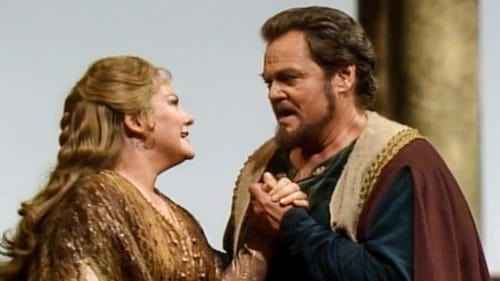
Conductor
As renowned for its harmonious overture as for its romantic storybook characters, this three-act masterwork features some of the composer’s most groundbreaking and unforgettable music, as well as a theme the young Wagner would revisit again and again later in his career—the redemptive and transcendent power of a woman’s love. The enchanting plot harks back to medieval history: Wolfram is a lovesick troubadour who desires the virtuous Elisabeth. She, however, has eyes for another: the rebellious knight Tannhäuser, who in turn cannot get over an overwhelming sensual experience in the realm of the goddess Venus, and is banished for singing her praises at court. Only saintly Elisabeth’s death can atone for his misdeeds.

Self - Conductor
As renowned for its harmonious overture as for its romantic storybook characters, this three-act masterwork features some of the composer’s most groundbreaking and unforgettable music, as well as a theme the young Wagner would revisit again and again later in his career—the redemptive and transcendent power of a woman’s love. The enchanting plot harks back to medieval history: Wolfram is a lovesick troubadour who desires the virtuous Elisabeth. She, however, has eyes for another: the rebellious knight Tannhäuser, who in turn cannot get over an overwhelming sensual experience in the realm of the goddess Venus, and is banished for singing her praises at court. Only saintly Elisabeth’s death can atone for his misdeeds.

Music Director
The Metropolitan Opera's performance of "Hansel and Gretel" features music by Engelbert Humperdinck and is conducted by Thomas Fulton. The Met's storybook production cheerfully evokes a magic world of woodland sprites and candy dreams and yet brings as well the entire apparatus of Wagnerian music and drama to bear on a German fairy tale. This production is sung in English, and features the Metropolitan Opera, Chorus, and Ballet.

In this stunning performance from 1982, Strauss’s enchanting fairy tale for adults is blessed with a cast, conductor, and production that have made it legendary—complete with superstar Luciano Pavarotti in the cameo role of the Italian Singer. Gorgeous Kiri Te Kanawa is the Marschallin, the gracious noblewoman who understands that her affair with a younger man cannot last. Tatiana Troyanos is every bit the passionate seventeen year old Octavian who swears he will never love another woman—until he meets the bewitching Sophie (Judith Blegen) when he presents her with a silver rose on behalf of the loutish Baron Ochs (Kurt Moll). James Levine’s inspired leading of the Met orchestra and the enthralling production by Nathaniel Merrill and Robert O’Hearn combine to bring Old Vienna, with its timeless elegance, to life once again.

Conductor
This “Traviata” became one of the most succesful of all opera films, especially in France, where 800,000 Parisian cinemagoers flocked to it in the first six week. It was nominated for two Oscars (for production and costume design) and won BAFTAs in those two categories, as well as receiving BAFTA and Golden Globe nominations as 1983’s Best Foreign-Language Film.

Conductor
Mozart’s “The Magic Flute”

Music Director
"La Bohème" is one of Giacomo Puccini's most popular and timeless works and the second-most performed opera at New York's Metropolitan Opera. This production, directed by the legendary Franco Zeffirelli, features José Carreras, Teresa Stratas, Renata Scotto and Richard Stilwell. The opera is replete with extraordinary visual beauty as it presents the tragic story of young bohemians struggling to make it in the world.

Conductor
"La Bohème" is one of Giacomo Puccini's most popular and timeless works and the second-most performed opera at New York's Metropolitan Opera. This production, directed by the legendary Franco Zeffirelli, features José Carreras, Teresa Stratas, Renata Scotto and Richard Stilwell. The opera is replete with extraordinary visual beauty as it presents the tragic story of young bohemians struggling to make it in the world.

Conductor
Opera royalty Luciano Pavarotti brings dignity and power to the title role in this 1982 production. During a squall at sea, Idomeneo -- the king of Crete -- swears to Neptune that if the monarch survives, he'll sacrifice the first person he encounters onshore. Tragically, that person ends up being his son, Idamante (Frederica Von Stade). Maestro James Levine masterfully conducts the orchestra and chorus of the Metropolitan Opera. A musical production that was designed for the "Live From the Met" series, this program was produced by Jean-Pierre Ponnelle.

Self - Conductor
"La Bohème" is one of Giacomo Puccini's most popular and timeless works and the second-most performed opera at New York's Metropolitan Opera. This production, directed by the legendary Franco Zeffirelli, features José Carreras, Teresa Stratas, Renata Scotto and Richard Stilwell. The opera is replete with extraordinary visual beauty as it presents the tragic story of young bohemians struggling to make it in the world.

Music Director
Opera royalty Luciano Pavarotti brings dignity and power to the title role in this 1982 production. During a squall at sea, Idomeneo -- the king of Crete -- swears to Neptune that if the monarch survives, he'll sacrifice the first person he encounters onshore. Tragically, that person ends up being his son, Idamante (Frederica Von Stade). Maestro James Levine masterfully conducts the orchestra and chorus of the Metropolitan Opera. A musical production that was designed for the "Live From the Met" series, this program was produced by Jean-Pierre Ponnelle.

Conductor
Placido Domingo celebrates the city that has inspired the greatest number of opera composers as a setting.
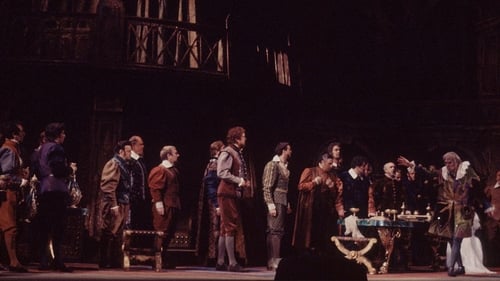
Music Director
The opera's dramatic structure frames and enhances the characters. Scenes of magnificence regularly alternate with scenes of darkness and squalor. From sumptuous interiors, we move to a dark street, a lonely inn. The secondary figures are astutely counterpoised: the plotting courtiers against the plotting Sparafucile and Maddalena (also ambiguously tender-hearted). When Rigoletto says "Pari siamo", he could be expressing the motto of the whole work: the beautiful and the ugly can be equally good, equally evil.

Self - Conductor
The opera's dramatic structure frames and enhances the characters. Scenes of magnificence regularly alternate with scenes of darkness and squalor. From sumptuous interiors, we move to a dark street, a lonely inn. The secondary figures are astutely counterpoised: the plotting courtiers against the plotting Sparafucile and Maddalena (also ambiguously tender-hearted). When Rigoletto says "Pari siamo", he could be expressing the motto of the whole work: the beautiful and the ugly can be equally good, equally evil.

Self - Conductor
James Levine leads a remarkable cast in one of Verdi’s most enduringly popular operas and brings fresh insights to this beloved score. Ileana Cotrubas is poignant and touching as Violetta, the consumptive courtesan who finds true love with Alfredo, sung with style and passion by the great Plácido Domingo. Cornell MacNeil is Germont, Alfredo’s father, who forces the two apart, setting in motion events that lead to a shattering and tragic conclusion. Colin Graham’s production features design by Tanya Moiseiwitsch and choreography by Zachary Solov.

Conductor
James Levine leads a remarkable cast in one of Verdi’s most enduringly popular operas and brings fresh insights to this beloved score. Ileana Cotrubas is poignant and touching as Violetta, the consumptive courtesan who finds true love with Alfredo, sung with style and passion by the great Plácido Domingo. Cornell MacNeil is Germont, Alfredo’s father, who forces the two apart, setting in motion events that lead to a shattering and tragic conclusion. Colin Graham’s production features design by Tanya Moiseiwitsch and choreography by Zachary Solov.

Music Director
Don Carlo (1980) Metropolitan Opera. Verdi / italian. King Philip's court is plagued by rebels, family squabbles and intrigue. The Spanish Inquisition tries to exert its influence. The tension finally ignites at the King's coronation, where heretics are to be burned at the stake

Conductor
The Metropolitan Opera live production of Richard Strauss's opera Elektra on February 16, 1980
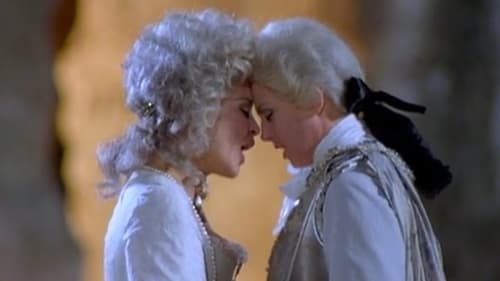
Conductor
"La Clemenza di Tito" was Mozart's last stage work. It was commissioned for an Imperial coronation ceremony while Mozart was at work on "Die Zauberflöte" and was composed in great haste. Indeed, time was so short that composition of the secco recitatives was assigned to Mozart's pupil Süssmayr. As in the earlier "Idomeneo", Mozart sought to produce an opera seria that was dramatically viable. He enlisted the poet Mazzolà to substantially revise the Metastasio libretto, which had already been set some fifty times. The number of arias was reduced from 25 to 11, and ensembles and choruses were added to enliven the proceedings. Though perhaps not the very top-drawer Mozart, the music is wonderful.
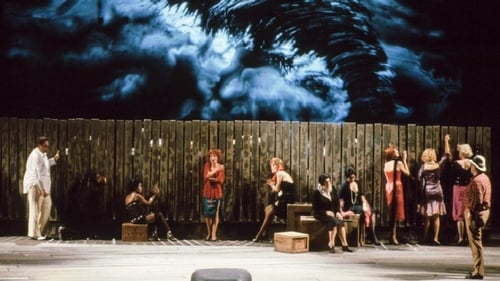
Conductor
John Dexter’s brilliant production, James Levine’s masterful conducting of the eclectic score, and a sensational cast come together to make this Kurt Weill–Bertolt Brecht masterpiece a riveting evening of music theater. At the center of the action is Jimmy Mahoney (Richard Cassilly), a logger who stumbles onto the city of Mahagonny, where (almost) anything is allowed. Teresa Stratas gives a mesmerizing performance as Jenny, the prostitute who takes up with Jimmy, until he is executed for the greatest of all crimes in Mahagonny—to not have any money. The legendary Astrid Varnay, in her final Met appearances, is Leocadia Begbick, and Cornell MacNeil sings Trinity Moses.

Conductor
In an Opening Night performance for the history books, the great Plácido Domingo sings the title role of Verdi’s Otello for the first time at the Met. This supremely demanding part was to become his signature role, an accomplishment against which other interpreters are still measured to this day. Domingo stars opposite Sherrill Milnes’s conniving Iago and Gilda Cruz-Romo’s touching Desdemona, all brilliantly conducted by Music Director James Levine.

Conductor
Renata Scotto is the innocent Luisa, very much in love with Rodolfo (Plácido Domingo in one of his best roles). But he turns out to be the son of the Count Walter (Bonaldo Giaiotti), who has other plans for his aristocratic boy. Enter the evil Wurm (James Morris) whose blackmail eventually backfires, destroying the young lovers despite everything Luisa's father (Sherrill Milnes in a superb performance) does to protect her. James Levine's affectionate conducting and director Nathaniel Merrill's production help make this a performance to treasure.
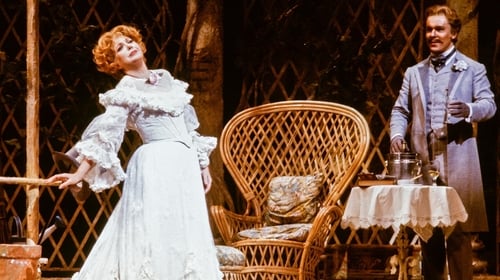
Music Director
This John Dexter production, designed by Desmond Heeley, was a parting gift to the great American soprano Beverly Sills, who bid farewell to the Met as Norina, the smart young widow at the center of Donizetti’s comedy. The sensational Alfredo Kraus sings her beloved Ernesto. Håkan Hagegård, in his Met debut role and season, is Dr. Malatesta, the man who helps the young couple trick the crusty old bachelor of the title (Gabriel Bacquier at his comical best) into a fake marriage. This being a Donizetti comedy, it all turns out perfectly well at the end—and getting there is pure operatic fun.
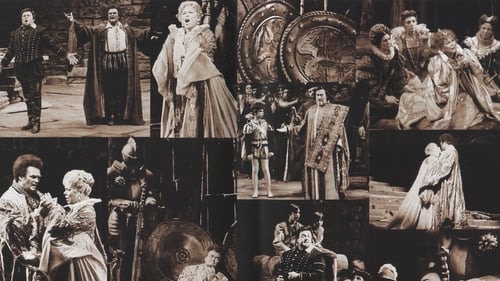
Conductor
Jon Vickers was one of the most magnetic singing actors of the 20th century and Otello one of his greatest roles. He understood how to combine Shakespeare’s rich characterization and Verdi’s dramatic music to create an overwhelming figure, one whose death left audiences deeply shaken. Vickers is perfectly partnered by James Levine’s conducting and the Met’s sensational orchestra and chorus. Renata Scotto is an appealing Desdemona, Cornell MacNeil is a menacing Iago, and Franco Zeffirelli’s production is deservedly legendary.

Conductor
Plácido Domingo accomplishes the rare feat of singing both leads on the same night at the Met in 1978 on opera's most popular double-bill.
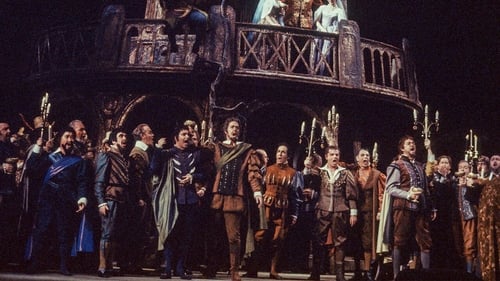
Conductor
A Victor Hugo play, haunting and scandalous, provided the inspiration for Verdi’s mid-career masterpiece. A vengeful but misguided court jester strives to save his daughter from a duke’s licentious clutches, but can't part with the feeling that a curse looms over all of his actions. In Rigoletto, the composer introduces several of his most iconic arias and duets—as well as an 11th-hour quartet that counts among the finest moments in opera.

Art Direction
A Victor Hugo play, haunting and scandalous, provided the inspiration for Verdi’s mid-career masterpiece. A vengeful but misguided court jester strives to save his daughter from a duke’s licentious clutches, but can't part with the feeling that a curse looms over all of his actions. In Rigoletto, the composer introduces several of his most iconic arias and duets—as well as an 11th-hour quartet that counts among the finest moments in opera.

Self - Conductor
A Victor Hugo play, haunting and scandalous, provided the inspiration for Verdi’s mid-career masterpiece. A vengeful but misguided court jester strives to save his daughter from a duke’s licentious clutches, but can't part with the feeling that a curse looms over all of his actions. In Rigoletto, the composer introduces several of his most iconic arias and duets—as well as an 11th-hour quartet that counts among the finest moments in opera.
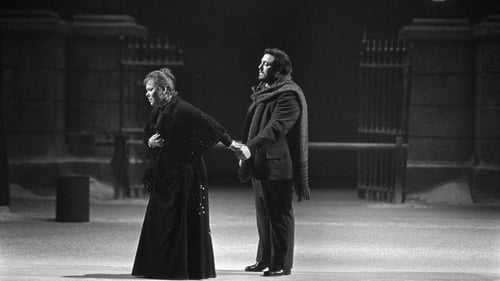
Conductor
Puccini’s heartbreaking story of young love in the garrets of Belle Epoque Paris has attracted many famous singers through the years. But with James Levine at the helm and the starry duo of Luciano Pavarotti and Renata Scotto as Rodolfo and Mimi, every bit of emotion in the score pours across the footlights and seduces the audience. In this case, the audience was in the millions since this was the very first in the “Live from the Met” series of telecasts. The evocative production is by Fabrizio Melano, designed by Pier Luigi Pizzi.

Conductor
Puccini’s heartbreaking story of young love in the garrets of Belle Epoque Paris has attracted many famous singers through the years. But with James Levine at the helm and the starry duo of Luciano Pavarotti and Renata Scotto as Rodolfo and Mimi, every bit of emotion in the score pours across the footlights and seduces the audience. In this case, the audience was in the millions since this was the very first in the “Live from the Met” series of telecasts. The evocative production is by Fabrizio Melano, designed by Pier Luigi Pizzi.

Self - Conductor
Mozart’s allegorical fairy tale has charmed audiences and inspired artists, for more than 200 years. A few weeks before this telecast, the Met unveiled a new production of the opera featuring the colorful designs of acclaimed artist David Hockney. His bold colors and vivid images enchanted audiences and seemed to inspire the striking cast, led by James Levine’s affectionate conducting. Francisco Araiza is the young prince Tamino, who finds himself in a strange land, forced to undergo mysterious tests so he can rescue, then marry, the woman he loves, Pamina, played by Kathleen Battle. Kurt Moll is the compassionate Sarastro and Luciana Serra is the Queen of the Night.
































































































































